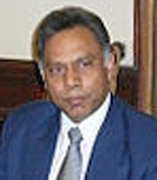- Indian envoy to UN


- Dillip Sinha
India on Thursday abstained from the vote at the United Nations session in Geneva which called for an international investigation into alleged war crimes in the final stage of Sri Lanka's conflict in 2009. Indian envoy Dilip Sinha spoke to NDTV's Noopur Tiwari after the vote in Geneva.
NDTV: For the last two years, here at the Human Rights council India has been voting "yes" for the adoption of resolutions on Sri Lanka. What made India decide to abstain this year?
Dilip Sinha: As I mentioned in my explanation of vote, for the last two years we voted for the resolutions because they were in line with our policy on the promotion and protection of human rights in the Human Rights Council. This year the resolution had a certain provision that can't go along with that policy of ours, which was introducing the concept of international investigation which was there in the operative paragraph ten. This was a matter of concern for us, which made us decide to abstain on the resolution.
NDTV: At one point in the proceedings, Pakistan made a request that this para ten be removed from the resolution. Had the council voted for this para to be removed (which it didn't) would India have voted "yes" for the resolution?
Dilip Sinha: There were other concerns also so I wouldn't speculate on what would have happened then. As far as para ten is concerned, that was a major point of concern, there were other concerns as well, but this operative para ten was the most important concern. It was a concern that we had expressed last year also in terms of any references to any international investigation.
NDTV: Does that mean that India's position is that there should be no monitoring from the Human Rights Council in Sri Lanka?
Dilip Sinha: The role of the council and of the Office of the High Commissioner have been laid down in what is called the institutional package which was approved by the Human Rights Assembly when the Human Rights Council was created. There have been other resolutions as well laying down the mandates of these various bodies. The most important idea is that the international community, which in this case is the Human Rights Council and the Office of the High Commissioner, their role is supportive. They provide assistance to national institutions to help countries strengthen their national institutions so that they can protect human rights. The primary responsibility of protecting human rights lies with the national institutions.
NDTV: In the report of the Office of the High Commissioner of the Human Rights Council, some issues have been raised about the implementation of the recommendations of Sri Lanka's own LLRC (Lessons Learnt and Reconciliation Commission) and other issues as well, you raised some of them too.
Dilip Sinha: We encourage Sri Lanka to fulfil its own commitments that it has made, both to the Human Rights Council in the process that's called UPR, as well as its own internal investigations through its LLRC and its National Action plan. We encourage Sri Lanka to fulfill its own commitments and conduct its own investigations in such a way that they are credible and are looked upon by others as acceptable investigations.
NDTV: But the report of the High Commissioner of the Human Rights Council has said that there is a lack of an independent, credible investigation by the Sri Lankan government.
Dilip Sinha: Other countries, other people are free to comment, but eventually it's for the country concerned to look at these. What is called "peer review" is done over here in the Council where other countries express their concerns. Then it's for the country concerned to take on board these concerns, listen to them and then apply them when it goes back to its own country, in a way that the country's own image is the image of a country that promotes human rights.
NDTV: Did India ask for any changes that were accepted to the current text of the resolution that has been adopted?
Dilip Sinha: The current resolution is that of the sponsors. Our concerns were of course conveyed in terms of the High Commissioner's investigations, also in terms of the role of the special procedures of the Human Rights Council and in terms of some of the comments of the internal issues of Sri Lanka. These are some of the points we have been addressing earlier as well as this year.
NDTV: Are any of these internal issues major concerns for India?
Dilip Sinha: Internal concerns are for Sri Lanka. The LLRC report is there. There are various investigations that have taken place, more needs to be done so we hope Sri Lanka will carry out these.
NDTV: What about the future course of action on Sri Lanka here at the Human Rights Council?
Dilip Sinha: That will depend on the resolutions. This you should ask the sponsors of the resolution.
NDTV: Would you then say that India has given full support to Sri Lanka because there's been a sense that for the last two years India has been going against Sri Lanka in a way?
Dilip Sinha: That was always a sense but we were never against Sri Lanka, we were always with Sri Lanka in this process. At the highest political level, we have conveyed to Sri Lanka that we stand for national reconciliation, peace and prosperity in Sri Lanka and we will do whatever is possible to help Sri Lanka in this process and we wish it success.
- See more at: http://www.dailynews.lk/?q=local/we-will-do-whatever-possible-help-lanka-indian-envoy-un




